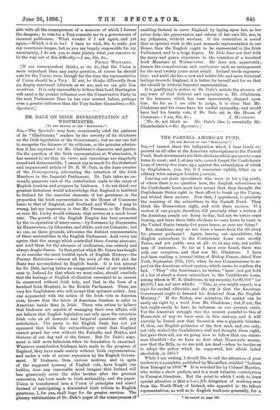DR. DALE ON IRISH REPRESENTATION AT WESTMINSTER.
[To THE EDITOR OF THE SFECTAT0R."1
Sia,—The Spectator may have occasionally tried the patience of its " Gladstonian." readers by the severity of its strictures on the Irish legislation of the Government ; but no one can fail to recognise the fairness of its criticism, or the genuine admira- tion it has expressed for Mr. Gladstone's character and genius. On the question of the Irish representation at Westminster, it has seemed to me that its views and reasonings are singularly sound and statesmanlike. I cannot say so much for the rhetorical and impassioned article of Dr. R. W. Dale, in the June number of the Contemporary, advocating the retention of the Irish Members in the Imperial Parliament. Dr. Dale takes an un- usually generous view of the contribution made to the cause of English freedom and progress by Irishmen. I do not think our greatest historians would acknowledge that England is indebted to Ireland for the essential elements of her greatness, in the proportion the Irish representation in the House of Commons bears to that of England, and Scotland, and Wales. I may be wrong, but my impression is that Mr. Freeman, or Mr. Fronde, or even Mr. Leary would estimate that service at a much lower rate. The growth of the English Empire has been promoted by the co-operation of many races,—by Germans, by Huguenots, by Hanoverians, by Ghoorkas, and Sikhs, and our Colonists ; but no one, on these grounds, advocates the distinct representation of these nationalities in the English Parliament. And every one agrees that the energy which controlled these diverse elements, and used them for the advance of civilisation, was entirely and always Anglo-Saxon. In that period which Mr. Green has taught us to consider the most fruitful epoch of English History—the Puritan Revolution—almost all the work of the field and the State was accomplished by English hands. It is but natural for Dr. Dale, having taken an exaggerated view of our indebted- ness to Ireland for that which we most value, should conclude that the heritage of English civilisation entrusted to us cannot be conserved without Irish help, and that in the form of a hundred Irish Members in the British Parliament. There are very few Englishmen who will accept that optimist notion. Any one acquainted with the action of the Irish vote in America even, knows that the fabric of American freedom is safer in American hands than in Irish. Those who refuse to believe that Irishmen are capable of managing their own affairs, will not believe that English legislation can rely upon the uncertain Irish vote on all domestic and Imperial questions with any satisfaction. The party in the English State has not yet appeared that holds the extraordinary creed that England cannot guard her own without the Parnells, and Healys, and Sextons of our day and of the future. Bat Dr. Dale's argu- ment is still more fallacious when its foundation is examined. Whatever contribution Irishmen have made to the progress of England, they have made mainly without Irish representation, and under a rule of severe repression by the English Govern- ment. If Irishmen, from various motives, and in spite of the supposed tyranny of English rule, have fought our battles, does any reasonable mind imagine that Ireland will less generously serve the elder brother after the greatest concession has been made to Irish nationality, and the paper- Union is transformed into a Union of principles and aims ? Instead of anticipating a diminished Irish tribute to English greatness, I, for one, shall hope for far greater services. The gloomy vaticinations of Dr. Dale's paper of the consequences of
enabling Ireland to serve England by laying upon her, as her prime duty, the preservation and reform of her own life, are, in my judgment, without warrant. If the contention is sound that co-operant work in the past demands representation in our House, then the English ought to be represented in the Irish Parliament, and to a large degree. Dr. Dale does not deal with the many and grave objections to the retention of a hundred Irish Members at Westminster. He does not, apparently, discern the complications and confusions such an arrangement for the next twenty years must entail. Ireland needs regenera- tion; and until she has a new and nobler life, and more fraternal feelings towards England, it is better for herself and for us that she should be without Imperial representation.
It is gratifying to notice in Dr. Dale's article the absence of any trace of that distrust and opposition to Mr. Gladstone, or his measure, which has been inaccurately charged upon him. So far as I am able to judge, it is clear that Mr. Gladstone and his cause have his cordial sympathy, and would have had his hearty vote, if Dr. Dale sat in the House of Commons.—I am, Sir, Scc., J. MaTruaws. [We do not think so. Dr. Dale's idea is essentially Mr. Chamberlain's.—En. Spectator.]


































 Previous page
Previous page